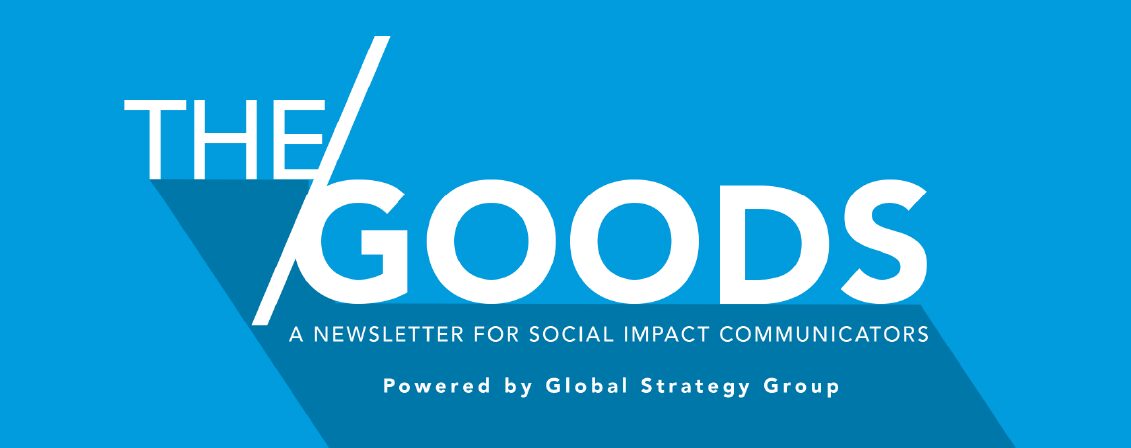
This month’s newsletter explores the real-world impact of a polarized political climate and increasing demands on corporations’ ability to engage in social impact work nationwide. Recently, the US Supreme Court delivered a decisive blow to affirmative action. This ruling arrives at a time when companies find themselves caught in the crossfire of culture wars. From consumer boycotts targeting popular beer brands to ultra-conservatives attacking financial institutions aligned with environmental, social, and governance investing principles, the challenges are mounting. As a result, DEI may soon become conservatives’ new targeted three-letter word, replacing ESG.
The Goods is a newsletter for social impact communicators that helps you keep track of the latest updates, trends, industry best practices, and much more. This content is compiled and curated monthly by Jade Floyd and Victoria Dellacava.

Quick Hit: For the first time in more than a decade, the Federal Trade Commission is revising its “Green Guides,” which offer principles and examples to help companies steer away from greenwashing.
Your Takeaway: Firms and agencies can learn a lot from household names in banking, aviation, and fashion who are making headlines for misleading content around sustainability initiatives – regulatory bodies are taking notice. (PR Week)
Quick Hit: According to Morning Consult’s 2023 Most Trusted Brands report, Gen Z is less likely than the rest of the population to say that they trust brands to do what is right.
Your Takeaway: Simply put, Gen Z wants brands to take a stance on social justice issues. According to the Harris Poll, 82% of Gen Z teens say, “There is still so much to be done in the fight against racism, this is just the start.” They expect companies to play their part to move the needle. (AdAge)

It’s “ESG month”…On the Hill, Republicans who lead the House Financial Services Committee plan to spend the next few weeks holding hearings and voting on bills designed to send a clear signal: corporations, in particular big investment managers, should think twice about integrating climate and social goals into their business plans. Committee conservatives will target the process in which advocates use the shareholder voting process to pressure public companies to adopt ESG goals.(Politico)
Quick Hit: Independent nonprofit JUST Capital’s new research reveals that public opinion impacts corporate conduct on workers and climate.
Your Takeaway: A recent study reveals that when evaluating American firms, the public places a significant emphasis on the treatment of workers. This priority remains consistent across demographic and political groups, making it a crucial factor for leaders aiming to improve their firms’ ESG performance related to their workforce. (Harvard Business Review)
Quick Hit: GSG Partner Matt Canter recently spoke at the National Association of Real Estate Investment Trusts (Nareit) conference on how companies can effectively build a narrative around their commitment to social issues.
Your Takeaway: Our latest Business & Politics report found most Americans are not familiar with the term ESG itself, so it is critical to tell a story rather than sling acronyms. (Nareit)

Quick Hit: According to a Harvard study, U.S. states that eliminated affirmative action hiring requirements have seen a significant decrease in workplace diversity compared to the states that kept affirmative action programs in place.
Your Takeaway: While the Supreme Court’s recent ruling on affirmative action is focused on government and universities, some corporate leaders could use it as a basis to abandon DEI recruitment and retention programs. Research shows that diverse, equitable, and inclusive workplaces are more agile, more resilient, and more successful than organizations that make less of those investments. (Bloomberg Law)
Quick Hit: DEI officer positions have been disproportionately hit by layoffs across industries, particularly at tech companies.
Your Takeaway: Diversity has proven to be good for business, according to several studies that indicate that companies that are more diverse are more innovative and, in turn, more profitable. Companies that fail to diversify could fall behind. (ABC News)

ICYMI
The latest op-ed from GSG’s Andrew Baumann and Melissa Bell, Ph.D. demonstrates why Democrats are poised to win a debate over climate and energy in 2024. “If this is a fight Republicans want to have at the ballot box, especially in difficult swing districts, Democrats should be more than happy to oblige.”
Jon Silvan’s, GSG’s Founding Partner and CEO, latest op-ed featured in Crain’s New York details the steps New York City needs to take to protect its legacy as a global cultural capital. Investing in housing, transit, and public spaces is investing in New York City’s future. “Here’s the reality: we can’t force people and businesses to move to New York City. We need to create an environment where they want to.”
GSG’s Joey Teitelbaum was featured on our partner SEC Newgate UK’s global podcast for Pride 2023. With fellow colleagues, they discuss their thoughts on the political and corporate landscape this Pride Month.
Quick Hit: Recent surveys from GSG and CNBC/SurveyMonkey Workforce found the top AI worry is job loss, with jobs in tech, manufacturing, marketing, and customer service thought to be most at risk.
Your Takeaway: When it comes to communicating, the human touch is still important, no matter how impressive the technology is. Your teams should edit, add nuance and originality, hone messages, and verify the information and verbiage generative AI so effortlessly produces. As elegant and impressive as its output can be, AI is still a tool for humans to wield intelligently. (Forbes)
GSG Clients in the News
Kate Swords, head of U.S. human resources at Cerberus Capital Management, wrote a recent piece in Fast Company Magazine on the “4 ways to make meditation your new workplace superpower”. She shares how daily 10-minute meditation practice can help highly driven and busy people to survive and thrive in high-pressure work and personal environments.
Daniela Fernandez, founder and CEO of the Sustainable Ocean Alliance, recently wrote a piece with Palau’s President Surangel Whipps, Jr. on the global call for a moratorium on deep sea bed mining. Together they call on global politicians and business leaders alike— to half the mining minerals under the sea and no longer allow destruction for the sake of profit or progress.
Did we tell you something good? Share with a friend.